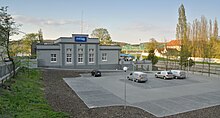Włocławek Rowing Club
The rowing club Włocławek (Polish Włocławskie Towarzystwo Wioślarskie ) is a rowing club that was founded in Włocławek in 1886 . Founding member of the Polish Association of Rowing Clubs (Polish Polski Związek Towarzystw Wioślarskich ). In the years 1921-1939 it operated under the name " Rowing Club in Włocławek " and in 1945-1949 as the " Rowing Club ".
history
The association was founded on the initiative of the Polish academics. In addition to promoting sports, the association set itself the goal of promoting patriotism in occupied Poland. A reading room was set up in the association's building and the “ Echo Wioślarskie ” men's choir gave concerts here. In 1903 a lecture was organized by Henryk Sienkiewicz , who came to Włocławek as an honorary member of the association.
In 1887 the rowers from Włocławek organized the first local regatta on the Vistula . Fourteen years later they achieved a remarkable feat: they sailed upstream along the Vistula to Płock .
The club building was only built in 1928 at 3 Piwna Street, at the confluence of the Zgłowiączka with the Vistula.
During the First World War , the association co-founded the local civil guard and established a primary school. Many rowers joined the Polish Military Organization (Polish Polska Organizacja Wojskowa ).
In the inter-war period, the club was expanded to include a women's department when the women's rowing club founded in 1919 was dissolved in the Vrein. From 1921, Jerzy Zygmunt Bojańczyk, a well-deserved person for the town and the local rowing, was for many years the president of the rowing club in Włocławek. Bojańczyk himself sponsored the construction of the large headquarters of the association. His competence was highly valued and enabled him to chair the jury at the Olympic Games in Amsterdam (1928) and Berlin (1936).
In 1929 Wiktor Szelągowski, Henryk Grabowski and Tadeusz Gaworski won the first gold medal for the club at the Polish championships, and in the same year the bronze medal at the European championships. A year later, the rowers took first place at the International Regatta in Antwerp. In the interwar period, the club was one of the ten best clubs in Poland ten times.
After the Second World War, the rowing club was reactivated immediately after the war and was again successful, taking fourth place out of 31 Polish clubs.
The communist authorities in People's Poland wanted to end the independence of the rowing club with its intellectual and elitist origins, which finally happened in 1949 two years after Bojańczyk's death, when the institution was included in the National Sports Department "Związkowiec". After centralization, rowing in Włocławek did not increase until the 1960s, largely thanks to the participation of coach Tadeusz Gawrysiak. His students (including Bogdan Piątek, Grzegorz Dudziński, Krzysztof Gabryelewicz, Marek Dudziński and Andrzej Peszyński) received numerous medals at national championships.
In 1987 the club became independent again - it was reactivated as the Włocławek rowing club.
Changes in the financing system
In the inter-war period, members of the association brought in their private property, built it with their own money and looked after it by paying high membership fees and with the help of large donations from local entrepreneurs. At the end of the 1930s, Ferdinand Bohm's grain coffee factory joined the sponsors, and thanks to this collaboration, the young workers began to train in the club. Today the financing of the rowing club works completely differently. A large part of the representative historical building was sold to the Kujaw University in Włocławek (Polish: Kujawska Szkoła Wyższa, abbreviation WSHE ), the rowers' membership fees are a profit margin and the coaches receive normal remuneration for their work. The association remains largely active, mainly thanks to funding from the city administration. The city also took care of the future of the club: a new marina was built for the rowers next to the old buildings.
Current state
The Włocławek rowing club trains children and young people. The alumni are successful in national and international sport. Fabian Barański is currently the club's best and most successful athlete. In 2019 he and Mirosław Ziętarski won the title of European champion in double sculls and the title of vice world champion in quadruple sculls (Szymon Pośnik, Dominik Czaja, Wiktor Chabel).
Also very successful are: Oliwia Muraska, Magdalena Szprengiel, Piotr Śliwiński, Weronika Klasińska, Wiktoria Klasińska and Julia Gęsicka.
On the occasion of the 120th anniversary (2006) the rowing club Włocławek was awarded the gold medal of the Polish Olympic Committee.
Individual evidence
- ↑ Ryszard L. Kobendza. Zarys 80-letniej Działalności Polskiego Związku Towarzystw Wioślarskich. Warszawa 2001, p. 14
- ↑ a b c d e f Ryszard Jarzembowski: Włocławskie Towarzystwo Wioślarskie, kluby i organizacje sportowe w latach Drugiej Rzeczypospolitej. W: Jacek Staszewski: Włocławek: dzieje miasta . T. 2: Lata 1918-1998. Włocławek: Włocławskie Towarzystwo Naukowe, 2001, pp. 353-363
- ↑ a b Ryszard Jarzembowski: Sport - rozwój organizacyjny i najważniejsze osiągnięcia. W: Jacek Staszewski: Włocławek: dzieje miasta . T. 2: Lata 1918-1998. Włocławek: Włocławskie Towarzystwo Naukowe, 2001, pp. 740-756.
- ↑ a b c d Ryszard Jarzembowski: Towarzystwa sportowe. W: Jacek Staszewski: Włocławek: dzieje miasta . T. 1: Od początków do 1918 roku. Włocławek: Włocławskie Towarzystwo Naukowe, 1999, pp. 619-623.
- ↑ a b c Agnieszka Góra: 120 lat Włocławskiego Towarzystwa Wioślarskiego. Przewodnik Katolicki, 2006, archived from the original on January 24, 2016 ; Retrieved on July 13, 2020 (Polish, No. 39).
- ↑ Urząd Miasta Włocławek: Budowa Przystani Wodnej na rzece Wiśle. Retrieved July 13, 2020 (Polish).
- ↑ Wojciech Alabrudziński. Stąd będą wypływać po medale . “Gazeta Pomorska”. No. 265, 2012-11-13
- ↑ Anna Pudlińska: Nowa przystań we Włocławku. Retrieved July 13, 2020 (Polish).



